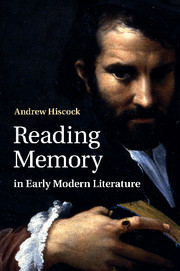Book contents
- Frontmatter
- Contents
- Figures
- Acknowledgements
- Introduction: ‘the dark backward and abysm of time’
- Chapter 1 ‘To seke the place where I my self hadd lost’: acts of memory in the poetry of Henry Howard, Earl of Surrey
- Chapter 2 ‘Remembre not (lorde) myne offences’: Katherine Parr and the politics of recollection
- Chapter 3 ‘Better a few things well pondered, than to trouble the memory with too much’: troubling memory and martyr in Foxe’s Acts and Monuments
- Chapter 4 Text, recollection and Elizabethan Fiction: Nashe, Deloney, Gascoigne
- Chapter 5 The Doleful Clorinda? Mary Sidney, Countess of Pembroke, and the vocation of memory
- Chapter 6 ‘Tell me where all past yeares are’: John Donne and the obligations of memory
- Chapter 7 ‘Of all the powers of the mind … the most delicate and fraile’: the poetry of Ben Jonson and the renewal of memory
- Chapter 8 ‘This art of memory’: Francis Bacon, memory and the discourses of power
- Notes
- Select Bibliography
- Index
Chapter 4 - Text, recollection and Elizabethan Fiction: Nashe, Deloney, Gascoigne
Published online by Cambridge University Press: 05 April 2014
- Frontmatter
- Contents
- Figures
- Acknowledgements
- Introduction: ‘the dark backward and abysm of time’
- Chapter 1 ‘To seke the place where I my self hadd lost’: acts of memory in the poetry of Henry Howard, Earl of Surrey
- Chapter 2 ‘Remembre not (lorde) myne offences’: Katherine Parr and the politics of recollection
- Chapter 3 ‘Better a few things well pondered, than to trouble the memory with too much’: troubling memory and martyr in Foxe’s Acts and Monuments
- Chapter 4 Text, recollection and Elizabethan Fiction: Nashe, Deloney, Gascoigne
- Chapter 5 The Doleful Clorinda? Mary Sidney, Countess of Pembroke, and the vocation of memory
- Chapter 6 ‘Tell me where all past yeares are’: John Donne and the obligations of memory
- Chapter 7 ‘Of all the powers of the mind … the most delicate and fraile’: the poetry of Ben Jonson and the renewal of memory
- Chapter 8 ‘This art of memory’: Francis Bacon, memory and the discourses of power
- Notes
- Select Bibliography
- Index
Summary
some alleadge, they trauell to learn wit, but I am of this opinion, that as it is not possible for anie man to learne the Arte of Memorie, whereof Tully, Quintillian, Seneca, and Hermannus Buschius haue written so manie bookes, except he haue a naturall memorie before: so is it not possible for anie man to attaine anie great wit by trauell, except he haue the grounds of it rooted in him before.
Thomas Nashe, The vnfortunate traueller. Or, The life of Iacke Wilton (1594)Drawing upon the heritage of Roman and Augustinian intellectual traditions, Thomas Nashe’s Jack Wilton, hero of The vnfortunate traueller (1594), offers in the midst of his frenzied peregrinations across Reformation Europe his own contributions to the lively cultural debate concerning the status and function of memory. In the interjection above, Wilton both acknowledges the pervasive legacy of rhetorical training at work within his society and promotes with his usual suasive tones his own innate ability to retrieve and exploit narratives of past experience – an ability that may allow him (and his readers) to apprehend sensitively and intelligently the multifariousness of the challenges that the present imposes. As we have seen, making their voices heard across the length and breath of Tudor society, those in spiritual and temporal authority focused remorselessly upon the business of ‘remembering oneself’, and starkly contrasted legitimate ‘place’ and ‘station’ with roving rebelliousness. As Nashe’s prose narrative unfolds, his protagonist fails to know his place in more ways than one and often expertly scrambles the readers’ own historical powers of recall as we are pulled from pillar to post, back and forth across decades and national borders on a continent being torn apart by religious schism. In his Arte of Rhetorique (1553), Thomas Wilson had railed ‘shall not an Oratour have in store good matter, in the cheste of his memorie, to vse and bestowe in tyme of necessitee?’; and Wilton is similarly determined to drain his own memorial fund of ‘good matter’ to its very limits to provide the frame for his seemingly endless cycle of adventures in early sixteenth-century Europe.
In his influential essay, ‘Epic and Novel: Toward a Methodology for the Study of the Novel’, Mikhail Bakhtin argued authoritatively that ‘The plane of comic (humorous) representation is a specific plane in its spatial as well as its temporal aspect. Here the role of memory is minimal; in the comic world there is nothing for memory and tradition to do. One ridicules in order to forget’. And, indeed, it may appear initially that Nashe’s troublesome page, first discovered malingering in the dark corners of Henry VIII’s court, salvages little of note from his own, very particular Grand Tour of Europe. However, while comic representation may indeed rely heavily upon the narrative resources of erasure, ellipsis and reduction (when in Rome, Wilton notoriously confides, ‘I was at Pontius Pilat’s house and pist against it’), Nashe’s textual ambitions clearly have little interest in amnesia. The successive moves to Wittenberg, Hampton Court, Florence, Venice and Rome chronicled in this prose narrative do not simply constitute a sequence of geographical displacements: they serve as memorial prompts with which to reflect upon the cultural roots of Elizabethan England, the genealogies of its religious, political and artistic formation.
- Type
- Chapter
- Information
- Reading Memory in Early Modern Literature , pp. 113 - 137Publisher: Cambridge University PressPrint publication year: 2011



